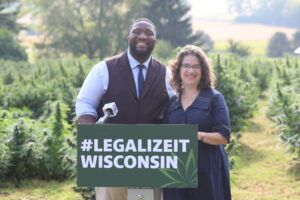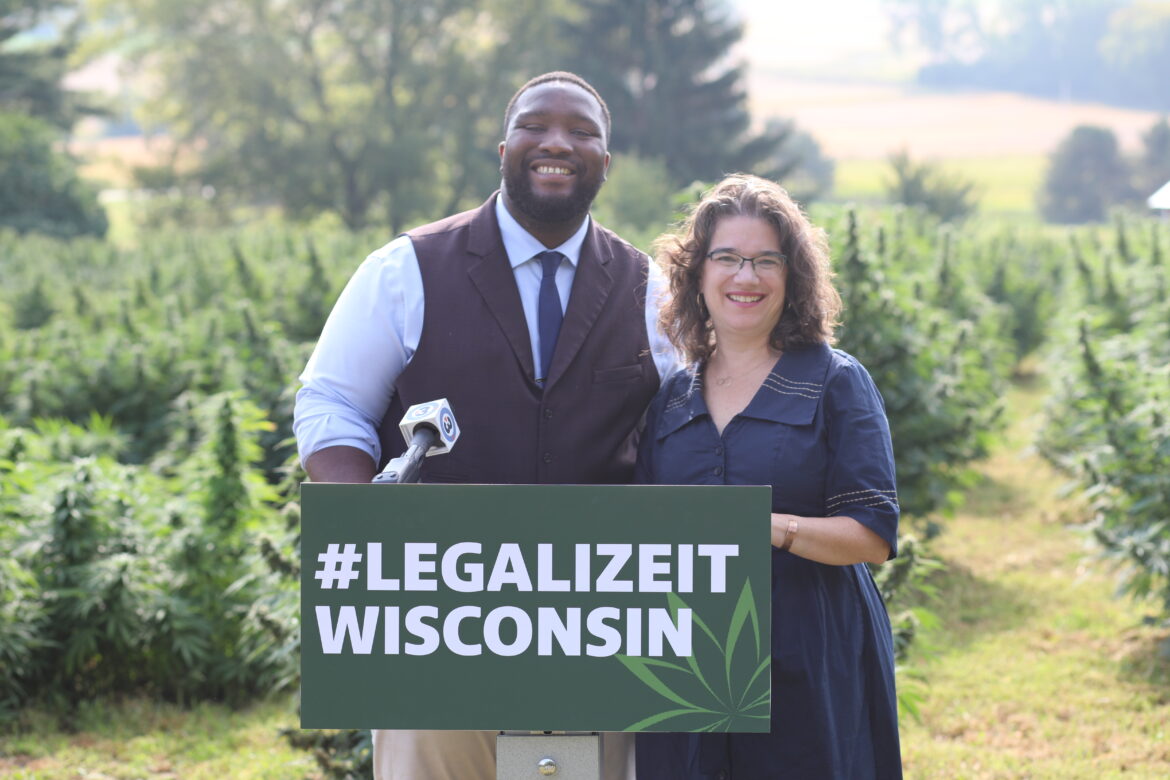In the state of Wisconsin a 13-year-old boy was diagnosed with brain cancer and given six months to live.
However, his parents refused to give up on him. They moved the family to Colorado and arranged to receive cannabis plants that they could grow legally to treat him with cannabinoids for his illness.
He died when he was 17, but had four years of a significantly better quality of life because of the cannabinoids, said Erik Rasmassen, a native Wisconsinite and professional in the cannabis industry. Rasmussen recounted the story of his college friend’s son to emphasize the importance of legalizing the use of recreational and medical cannabis in Wisconsin.
While some people have reported medical and social equity benefits to legalizing cannabis, there is still a lot about the substance that medical professionals do not support, and also do not know. Some in the state of Wisconsin are pushing for it to join its neighbors in reforming cannabis laws, however it is unclear whether this is something both legislators and residents will get behind. There’s an ongoing debate about whether legalizing marijuana is a solution or solely putting a Band-Aid on larger social and personal issues.
According to a Marquette Law School poll of Wisconsin residents, nearly two-thirds of registered voters believe that recreational and medical use of marijuana should be legalized. State Senate Minority Leader Melissa Agard (D-Madison) and state Rep. Darrin B. Madison (D-Milwaukee) introduced legislation to legalize recreational and medical marijuana use for adults that would allow the majority of Wisconsinites’ beliefs to be reflected in state law.
Wisconsin is one of the only states in its surrounding area that has not legalized recreational and medical marijuana use.
Democratic Gov. Tony Evers presented proposals to legalize recreational and medical marijuana in his two-year state budget earlier this year. But for this legislation to pass, it must be approved by Wisconsin’s Republican-majority legislature, which has for the most part been opposed to cannabis reform, although Assembly Speaker Robin Vos has recently indicated that Republicans might be open to creating legislation or to legalize medical marijuana.
“We just need to have a real conversation about doing this, and that only starts if folks come to the table,” Madison said. “This is why we are presenting this pathway forward, because we know it’s the right time.”
Under the proposed legislation, individuals 21 years or older would be able to use and possess up to five ounces of marijuana. The legislation removes criminal penalties for possession for individuals under the age of 21, and adults who had been previously charged with possession of more than five ounces of cannabis would no longer face felony charges.
Cannabis producers would be subject to a 15% excise tax levied at the wholesale level, and lounges would pay a 10% tax on cannabis sales. However, under the legislation, medical marijuana is not taxable.
Cannabis sales in Wisconsin are estimated to bring in $165 million annually in tax dollars, and 60% of the money made from cannabis sales would go to reinvestment grants to help marginalized people get licensing or startup funds, and support folks in reentry from prison or those combating addiction.
Madison said the reinvestment grants should be defined broadly enough so government officials can work with the department to efficiently ensure that the people they want to have access to these resources get them.
“The worst thing about cannabis is that it’s not legal,” Madison said. “There are more harms in not legalizing it and allowing folks to consistently continue in an illegal market that has more potential of ruining their lives than if we legalized it, and had set regulatory standards.”
However, marijuana consumption may still pose social and personal costs to the consumer. Similar to tobacco, marijuana has the potential to be manipulated by growers and corporations.
Madison believes that the departments would be able to set those regulatory standards through their rulemaking process. “We’ll always have to continue to address how cannabis is legal and illegal in our country, in this state and in other states, too,” Madison said.
On the other hand, Rasmassen believes it is possible that producers can manipulate the plant in a way that may make it more harmful, or just to generate more revenue.
“On the extraction side and the cannabinoid side, I don’t know if they’re going to make it more harmful,” but it is a potential risk, Rasmussen said. “We haven’t studied enough to know what the true side effects are... if it’s not smoked, it essentially makes you a little hungry, and you can get a little anxiety.”
Rasmassen believes the real harm is not letting people have the choice of what they put in their bodies or how they treat illnesses or how they supplement, also citing that marijuana has one of the lowest toxicity levels amongst substances.
Even so, research has shown that cannabis is still an addictive substance that can cause harm to consumers. According to a study by Missouri Medicine, data clearly shows that about 10% of those who use cannabis become addicted, and this number is higher amongst adolescents. Additionally, a study done by Johns Hopkins School of Public Health indicates that using cannabis causes risks for mental health consequences, including onset of psychosis or schizophrenia.
Dr. Ritu Bhatnagar, associate director of psychiatry and addiction psychiatrist at UW–Madison, said the statistics are not as dire for cannabis use and morality as they is for substances such as opioids and fentanyl. But it is challenging when the discussion stops there. She said people take that fact, magnify it and use it to support the argument that cannabis should be legal.
“I always stop people, and say, no, hang on a second. Does that mean that our choices are either I take opioids and die, or I take marijuana? Are those really your only two choices?” Bhatnagar said.
According to Bhatnagar, professionals are seeing other harms specifically related to cannabis use in both young people and in society at large. People claim there are medical benefits to cannabis use, however, she wants to make it really clear that so far that has not been proven.
Bhatnagar said cannabis has been shown to have a significant impact on the developing brain and questions whether there is enough information for professionals to be able to say its safe to use for the general public without further restrictions.
“I think the challenge when we legislate medicine is that it’s not based on the science,” Bhatnagar said. “I’d love as a physician to be able to say, ‘You have this problem, use this amount of this, this plant, this variety.’ But the danger is, I don’t know what I’m prescribing.”
As a professional at an educational institution, she said people are in college trying to figure out the rest of their lives, and marijuana use can interfere with that process. “They’re trying to learn and understand and grow, and then doing something to actively shut that down.”

She also understands that those who are benefiting from the legalization of marijuana are larger growers, usually affluent white people who have the capital for it. The decriminalization of marijuana does seem to discriminately impact people in minority groups or marginalized groups, Bhatnager said. Yet she still questions whether the benefits of legalizing cannabis outweigh the known risks, including the potential for addiction and cannabis-induced psychosis.
Black people are disproportionately affected by the illegalization of cannabis.
According to an ACLU national report, Black people in Wisconsin are actually 6% more likely to be arrested for marijuana possession despite Black and white people having similar usage rates.
The bill being put forth in Wisconsin would eliminate the ability for police officers to pull over individuals simply for the smell of cannabis.
“We are now eliminating a tool that can be used to do harm to communities of color,” Madison said.
Furthermore, Madison believes that Wisconsin can use the revenue from this bill to address other social determinants of health in broader communities, from education to health care to housing — all things that disproportionately affect communities of color.
“And then we can provide economic opportunities for folks to participate in our economy in ways they traditionally haven’t,” Madison said.






